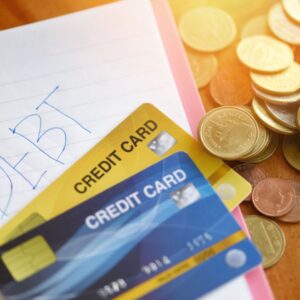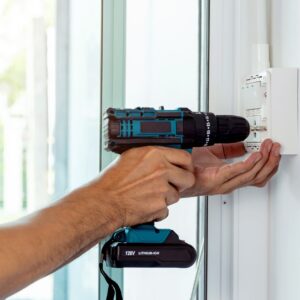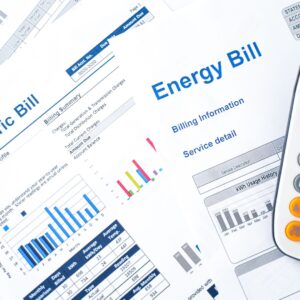There are many ways to become successful with money. One of the best ways is to de-risk your money.
What Does De-Risk Your Money Mean?
To de-risk your money is kind of like it sounds. And that’s to take as much risk out of it as you can. Here’s an example.
Someone netting $5,000 per month with $4,800 in expenses and no emergency fund is extremely high risk because one bad month will put them in the red.
They only have a $200 cushion, which won’t be enough most months. This person is at risk of getting into credit card debt and/or taking out high interest rate loans.
While someone netting that same $5,000 per month but with only $3,900 in expenses and a six month emergency fund is in a much better overall financial position. If there’s an unexpected expense, they’ll be able to absorb it.
De-Risk Your Money
Here are seven ways to de-risk your money, starting with no consumer debt.
Number 1: No Consumer Debt
In addition to paying a lot of money in interest every month, consumer debt has another big risk. It’s an extra bill that has to be paid.
For example, someone with $7,600 in consumer debt (let’s say credit card) has to make the minimum payment. While someone with zero consumer debt simply doesn’t have that expense to pay.
Even if both people have terrible months, one has a minimum payment while the other doesn’t. That extra bill amplifies the bad month.
And if someone has multiple consumer debts, they have to pay the minimum on all of it. This creates a risky and stressful financial situation each and every month.
Number 2: Emergency Fund
We know things are going to go wrong, we just don’t know when. That’s exactly what an emergency fund is for—the inevitable unknown.
Imagine something goes wrong, say an unexpected $3,200 expense. The person with an emergency fund simply pulls from it and pays the bill. The person without the emergency fund has to put it on the credit card, get a loan, delay paying the expense, etc. All not very good options.
Number 3: Minimal to No Leverage
Leverage is a very powerful double edged sword financial strategy that works when assets go up, but comes with significant risk. Leverage is often used by those in the wealth building stage and is also known as “good debt.”
Whether you call it good debt or bad debt, leverage is debt and debt comes with risk. The person in debt owes someone else money that has to be paid back, including good debt. This is where the risk is.
Whether using leverage is a good strategy or not is for another post. For this post, the point I want to make is that less leverage equals less risk.
A paid for mortgage on a rental property is less risky than a rental with a $2,000 monthly mortgage payment. Same as a duplex paid for in cash is less risky than one with a $3,500 monthly mortgage.
Number 4: Live Below Your Means
When you live below your means, you are naturally putting financial protections into place. Sounds obvious right? Make $6,000 per month and live on $4,000, make $10,000 and live on $7,500, etc.
Way too many people live at or above their means, and that’s when the real trouble begins. Someone making $5,000 and spending $5,000 or more is in serious trouble. Same for someone making $8,500 and spending that or more. It’s unsustainable and financially dangerous.
Number 5: Fix Things Early
In my backyard, I noticed my fence is starting to lean a little bit. If I fix it now, I can have a few posts repaired and the fence should last another 10 or more years. If I wait, the whole thing could fall and it will probably cost a lot more to repair.
This is an example of why you want to fix things early. Fix it while it’s a small issue instead of waiting for it to be a big issue. This applies to all areas of life: home repairs, car maintenance and repairs, health, relationships, and much more.
The simple act of fixing things early is a great way to de-risk your money life.
Number 6: Warranties and Insurance
Being strategic about warranties and insurance is a big way to de-risk your financial life. You can insure or get an extended warranty on virtually everything now, that’s why it’s important to be strategic.
There’s a fine line between de-risking and paying too much trying to account for anything in life that could possibly up. For example:
- Good insurance from a reputable company and an umbrella policy: de-risking
- Life insurance: de-risking
- Health insurance: de-risking
- Extended warranty on a car: depends
- Pet insurance: depends
- Travel insurance for a short trip: paying too much
- Extended warranty on a TV: paying too much
You may have different answers or opinions but this is where I’m coming from. I want to insure and/or get warranties on the big things. For some of the smaller stuff, I’m willing to absorb the risk.
Number 7: Eliminating or Minimizing Routine Expenses
Is it possible to eliminate or reduce your electric bill? What about your water bill? Can you eliminate paying for gas?
My answer to this is yes, it’s possible to at least minimize. Here are a few things I’ve done as proof:
- Paid for solar panels in cash. There was an upfront cost but monthly electric bills are very minimal.
- The solar panels also support charging the one electric vehicle we have. Our other car is gas so we’ve eliminated gas in one car and still incur the cost on the other vehicle. About a 50% reduction in fuel costs.
- Drought tolerant landscape in part of the yard to reduce water costs. We still have a decent sized water bill but it’s much less than if we had grass or landscaping that required a lot of water all over the property.
We don’t have it down perfectly but a lot of bills we used to have are either gone or a lot less. I’m not to the point of calling it life changing money but it definitely helps monthly cash flow.
Conclusion
You can de-risk your money life a lot of different ways. The common theme is the less potential financial obligations you have, the less risky your money life.
For example, having health insurance reduces the financial burden you’d have to carry for an overnight stay at the ER. A car under warranty decreases your burden if the transmission goes out. Solar panels cut down on your monthly energy bills.
The list goes on and on. Even de-risking one thing like getting out of consumer debt is a huge help, and the more you de-risk the better off you are financially.
How do you de-risk your money?








